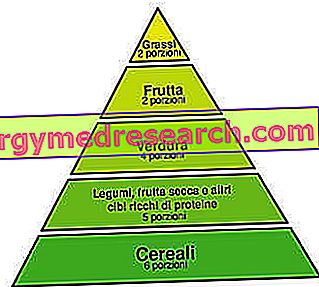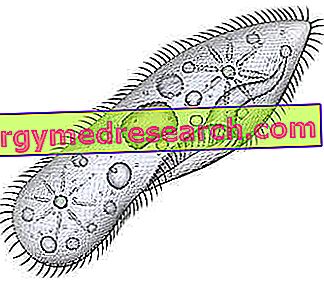Generality
The interest in the vegetarian diet has increased a lot in recent years, also thanks to the sensation caused by recent events such as avian flu, the so-called "mad cow", the relationship between red meat and tumors, or repeated episodes of mistreatment animals on intensive farms.

Insights
Possible Nutritional Deficiencies Vegan Diet Example Vegetarian Diet Example Vegan Diet Benefits for Adults and Children Sports and Vegetarian DietVegetable RecipesVegan RecipesTypes of Vegetarian Diet
How many types of vegetarian strand diet exist?
In the common imagination, the vegetarian diet is often understood as a simple diet, devoid of products of animal origin.
In reality the concept is much broader, given that in the large family of vegetarianism different food models can be included; let's see them in detail.
Vegetarian lacto-ovo diet
The lacto-ovo-vegetarian diet allows to feed on vegetables, micro-organisms (molds and bacteria) and food deriving from animals, such as eggs, milk, cheese and honey. It excludes the consumption of meat and fishery products (including molluscs and crustaceans).
It is good to remember that some cheeses are obtained with the addition of animal rennet (enzymes of the calves' stomach); as such, they should be excluded from any vegetarian regime.
Recently, many dairy companies have adapted to the needs of vegetarians by replacing animal rennet with a vegetable rennet.
Latte-vegetarian diet
The lacto-vegetarian diet also excludes eggs, but milk and derivatives are allowed; honey consumption is at the discretion.
Ovo-vegetarian diet
The ovo-vegetarian diet also excludes milk and dairy products but not eggs; honey consumption is at the discretion.
Vegan diet
The vegan diet renounces all products that involve animal involvement, including eggs and derivatives, such as dairy products and honey. It represents the vegetarian diet "in the strict sense".
NB . Recall that the vegan philosophy does not allow any animal involvement for the benefit of the human being. This also excludes the use of wool and silk for clothing, drugs obtained through animal experimentation, and certain fertilizers used in agriculture (especially blood, bone and horn flour, and fish).
The use of manure is controversial, since the suitability depends on the origin (it is to be excluded that deriving from the farms), just as some vegans do not admit biological control in cultivation (which is based on the biological antagonism of some organisms, on traps entomological, etc.).
Raw food diet
It is a vegan diet based only on the consumption of raw fruits and vegetables or processed at temperatures not exceeding 40 ° C.
Fruitist diet
It is a vegan diet that only allows the consumption of fruits: fleshy (apple, pear, orange, pepper, tomato, aubergine, courgette, melon, watermelon, pumpkin, etc.), oily seeds (walnuts, hazelnuts, pine nuts, pistachios, almonds etc.) and sprouted seeds (alpha alpha, soy, carrot, barley, peanuts etc.).
Eco-vegan diet
It is a vegan diet similar to the traditional one, but which requires the consumption of only plant foods coming from organic or bio-dynamic cultivations.
The vegetarian diet has ancient roots and the motivations that push a person to adopt it can be numerous (religious, ethical, economic, ecological, healthy, etc.).
In this article we will focus mainly on the health aspect, analyzing the strengths and weaknesses of vegetarian diets and proposing some examples of correctly balanced vegetarian menus.
Benefits
According to its supporters, the vegetarian diet (in all its types) is able, by itself and without additions, to satisfy the recommendations for all nutrients. As we will see later, this is a questionable statement at least.
Certainly it can have a positive metabolic impact and favor, in some ways, the maintenance of health status. Let's see how.
What are the benefits of vegetarian diets?
The vegetarian diet, associated with a healthy lifestyle, reduces the risk of these diseases linked to the modern lifestyle:
- Overweight and obesity
- Type 2 diabetes mellitus
- Hypertriglyceridemia
- LDL hypercholesterolemia (bad cholesterol)
- Hypertension
- Vascular diseases
- Some forms of cancer.
Overweight and obesity
The vegetarian diet is not always related to a normal body mass index.
On the contrary, many forms of disorganized and poorly managed vegetarianism can promote overweight.
This is the case with nutritional regimens that are mainly based on the consumption of white pasta and bread, potatoes, fatty cheeses, oil seeds and abundant dressing oils.
On the contrary, vegetarian diets rich in fresh vegetables and with the right amount of fruit, cheese, eggs, cereals, oils, oil seeds and tubers should favor the maintenance of a BMI between 18.5 and 25.0 (normal) .
Type 2 diabetes mellitus and hypertriglyceridemia
We associate these two metabolic disorders as blood triglycerides increase due to hyperglycemia, the characteristic factor of type 2 diabetes mellitus and pre-diabetes.
Not all vegetarian diets are preventive against type 2 diabetes and hypertriglyceridemia.
Only those rich in fresh fruit and vegetables, cereals and wholegrain derivatives, and legumes that are not decorticated are considered beneficial.
Hypertriglyceridemia is enhanced by abundance in alpha linolenic acid (essential omega 3 polyunsaturated).
On the contrary, monothematic vegetarian diets based on cereals and refined derivatives can determine an increase in blood sugar, triglyceridemia and promote the onset of diabetes (as well as overweight).
LDL hypercholesterolemia
Vegetarian diets, especially vegan ones, can significantly lower LDL and total cholesterol.
This happens thanks to the scarcity of cholesterol and saturated fats in the foods consumed, but also with regard to the richness of beneficial fatty acids (especially the essential polyunsaturated omega 6 linoleic acid) and other nutritional factors that exert a positive metabolic impact (polyphenolic antioxidants, vitamins A, C, E, vegetable lecithins and phytosterols).
Vegetarian diets that include fried foods and belong to the category of junk food (sweet and savory snacks) are instead characterized by the abundance of tropical oils (tendentially saturated) and / or hydrogenated fatty acids (which have the same metabolic impact as the saturated).
Hypertension
The exclusion of preserved meats and fish (cured meats, sausages to be cooked, canned tuna, etc.) has a positive effect on the onset of sodium-sensitive hypertension.
Furthermore, the essential omega 3 polyunsaturated fatty acid alpha linolenic acid, abundant in certain oil seeds and oils, has a marked hypotensive effect.
Vegetarian diets are also rich in potassium and magnesium, two minerals that hinder the action of excess sodium to the benefit of blood pressure.
However, it must be specified that vegetarian diets play a preventive role against hypertension only when they allow us to maintain normal weight and do not make an abundant use of seasoned cheeses, preserved foods and added salt.
Vascular diseases
The scientific data are difficult to interpret.
Fruit and vegetable consumption seems to be associated with a reduction in the risk of onset for vascular diseases.
This is because, for various reasons, vegetarian diets improve metabolic pathologies and decrease the process of atherosclerosis.
Furthermore, they could have a positive effect on blood fluidity and decrease the risk of platelet aggregation; this prevents the agglomeration of thrombi potentially responsible for embolism and stroke. The vegetarian regime statistically decreases mortality from this disease.
However, some believe that vegetarian diets may be responsible for hyperhomocysteinemia (due to vitamin B12 deficiency), a very important risk factor for vascular diseases.
Cancer
The bibliographic data concerning the correlation between diet and cancer are not completely clear and sometimes even contrasting.
For example, many believe that the consumption of proteins of animal origin can favor the appearance of certain tumors. In this case, vegetarian diets would undoubtedly play a preventive role.
On the other hand, the scientific evidence on the subject is not absolutely clear or well defined.
Instead, it has been shown that the richness of vegetable fibers and antioxidants (vitamins, polyphenols, etc.) can have a preventive effect against the tumors of the digestive tract.
Defects and Disputes
What are the negative aspects of vegetarian diets?
The classic problems of the vegetarian diet concern the alleged deficiency of iron, vitamin B12, vitamin D, protein and calcium (only if milk and derivatives are also eliminated from the diet). If it is true that it is possible to satisfy the needs of these nutrients by avoiding the use of animal products, some very important aspects must be taken into account:
- Not all people have in-depth knowledge in the food and diet field; in the absence of such bases, it is very easy to fall into error, in fact it is enough to deviate even slightly from the proposed food models to reduce the intake of nutrients below the recommended values. For example, replacing the green radicchio with the red one would generate an important iron deficiency (assuming that, as we will see in section 4, radicchio iron may have a significant nutritional importance).
- The same supporters of vegetarianism are shooting themselves in the foot when, after stating that the vegan diet is healthy and complete, they suggest the use of supplements or fortified foods to avoid specific vitamin or mineral deficiencies. Especially for a sportsman, for a pregnant woman, for a nurse, for a small child and for an elderly person, the vegan diet is not easy to "balance" and it is normal that it requires integration; it would be mature, on the part of the vegan community, to admit to being potentially subject to certain nutritional deficiencies. It is a reasonably reasonable price to pay to defend one's principles and ideologies.

- The vegetables, as we have seen, are fundamental for our health, but like all things it is good not to exceed with their consumption. Overdoing it with fruit, vegetables, cereals, pseudocereals and legumes can be counterproductive. Too many vegetables provide an excess of fiber, oxalates and phytic acid, substances that hinder nutritional absorption and especially that of some minerals - including calcium, iron and zinc - of which certain vegetarian diets are already basically poor.
- It should also be remembered that the outer part of the seeds, which is normally removed during refining and instead preserved in whole foods, has a greater exposure to the chemicals used in agriculture. For this reason, it is good to ascertain the origin of whole foods, in order to avoid the excessive introduction of harmful substances to our body. It is now established that the body has systems for eliminating contaminants and that, respecting a varied diet, it is perfectly capable of healing itself. On the other hand, by increasing dramatically the intake of certain pollutants it cannot be excluded that these can accumulate and damage health.
- The iron present in plant foods is less absorbable than that typical of animal products. It is caught slowly and in smaller quantities (only 5-10% of ingested vegetable iron is actually absorbed). The uptake of this mineral depends on the chemical form in which it is found; in fact the emic iron is better absorbed than the non-emic one. Hemic iron is present in meat, in fishery products, in offal and in eggs, while non-emic iron is found mainly in vegetables (mainly legumes and cereals). Over 20% of the EME iron introduced with the diet is absorbed in the intestine, while non-EME iron is taken in less than 5%.
Iron absorption:
- Increases in the presence of vitamin C (point in favor of the vegetarian diet)
- It decreases if associated with the antinutritional factors already mentioned in point 3
- Decreases if associated with a substantial calcium and phosphorus content
- It increases with decreasing gastric pH (point in favor of the traditional omnivorous diet, which requires a certain acidity in the stomach to digest the greater quantity of proteins contained in foods of animal origin).
Recipes
Enter the kitchen of MypersonaltrainerTv and discover many vegetarian and vegan recipes.
Carasau bread pie with stracchino and Asiago courgettes
X Problems with video playback? Reload from YouTube Go to Video Page Go to Video Recipes Section Watch the video on youtube



